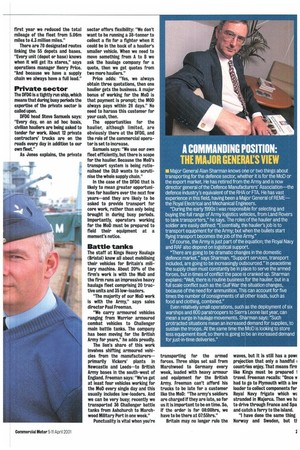A rji LJL I I r POSITION:
Page 31

If you've noticed an error in this article please click here to report it so we can fix it.
THE MAJOR CENERA13 VIEW
• Major General Alan Sharman knows one or two things about transporting for the defence sector, whether it is for the MoD or the export market. He has retired from the Army and is now director general of the Defence Manufacturers' Association—the defence industry's equivalent of the RHA or FTA. He has vast experience in this field, having been a Major General of REMEthe Royal Electrical and Mechanical Engineers.
"During the early 1990s I was responsible for selecting and buying the full range of Army logistics vehicles, from Land Rovers to tank transporters," he says. The roles of the haulier and the soldier are easily defined. "Essentially, the haulier's job is to transport equipment for the Army; but when the bullets start flying transport becomes the job of the Army.'
Of course, the Army is just part of the equation; the Royal Navy and RAF also depend on logistical support.
"There are going to be dramatic changes in the domestic defence market," says Sharman. "Support services, transport included, are going to be increasingly outsourced." In peacetime the supply chain must constantly be in place to serve the armed forces, but in times of conflict the pace is cranked up. Sharman explains: "Well, there is routine business for the haulier, but in a full scale conflict such as the Gulf War the situation changes, because of the need for ammunition. This can account for five times the number of consignments of all other loads, such as food and clothing, combined."
Even relatively small operations, such as the deployment of six warships and 800 paratroopers to Sierra Leone last year, can mean a surge in haulage movements. Sharman says: "Such protracted situations mean an increased demand for supplies, to sustain the troops. At the same time the MoD is looking to store less equipment itself, so there is going to be an increased demand for just-in-time deliveries."
























































































